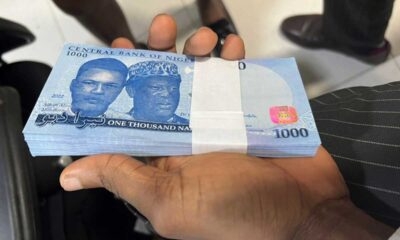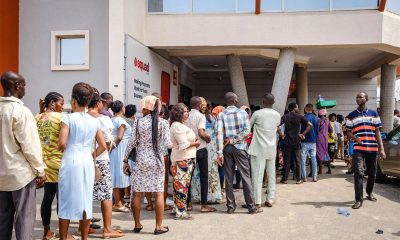Business
Again, CBN devalues Naira, pegs new exchange rate

Again, CBN devalues Naira, pegs new exchange rate
The Central Bank of Nigeria (CBN) has devalued the Naira to N631 to the dollar from N461.6 it sold at the Importers and Exporters (I&E) window the previous day.
The devaluation came 48 hours after President Bola Ahmed Tinubu announced the plans of the federal government to unify the country’s exchange rate to stimulate the economy.
In his inaugural speech, minutes after he was inaugurated as the 16th president of the country, Tinubu said, “Monetary policy needs a thorough house cleaning. The Central Bank must work towards a unified exchange rate. This will direct funds away from arbitrage into meaningful investment in the plant, equipment and jobs that power the real economy.”
There has been a wide margin between the I&E window and the parallel market, a situation that experts say encouraged round-tripping with Bureau de Change operators.
The situation has seen the CBN devise several measures to check the practice as well as completely stop the sale of forex to BDCs.
On Tuesday, President Tinubu met with the top echelon of strategic institutions including the CBN Governor, Godwin Emefiele, at the presidential villa.
READ ALSO:
- Fayose hails Tinubu over subsidy removal
- Arrest, prosecute Ganduje over dollar videos, CSO asks EFCC
- Tribute to Ama Ata Aidoo: Africa’s literary icon, fear writer who inspired Burna Boy
- PDP Senators Urhoghide, Akinyelure resign from party in Ondo
At the end of the meeting, neither the presidency nor Emefiele disclosed the outcome of the briefing. It was, however, gathered that the issue of the exchange rate was discussed at the meeting.
The President also met with the Group Chief Executive Officer of the Nigerian National Petroleum Company Limited, Mele Kyari. The removal of petrol subsidy was discussed, it was gathered.
However, findings revealed that at the resumption of the weekly bidding for foreign exchange, the apex bank sold the spot rate to banks on behalf of their customers at N631 to a dollar and most bidders got the full amount they requested.
One of the customers told this paper that they applied and that their request was fully granted at N631 as against N461.6.
The move has also seen prices at the parallel market trend downwards. Checks by this paper revealed that prices dropped from N750 to a dollar in the early hours of yesterday to N745 by evening in Abuja and Kano respectively.
The naira weakened in the parallel market to the lowest level in a year on expectations of a possible change in exchange rate management after Tinubu takes office on Monday.
The naira dropped to N762 a dollar on Friday from 775 the previous day in the unauthorized market in Lagos, said Umar Salisu, a BDC operator who tracks the data in the nation’s commercial capital.
The unit has weakened steadily in the parallel market since last week after stabilizing for most of this year.
The market arbitrage (difference between the official and parallel markets) has widened in the past three years from N100 per dollar or about 30 per cent in 2020 to over N400 per dollar (above 100 per cent) sometime last year when the black market rate spiked to N880/$.
Development institutions, including the International Monetary Fund (IMF), are wary of exchange rate differential in excess of five per cent and warn that such could trigger unhealthy manipulation that could negatively affect other efforts on market stabilisation.
From 2020 to 2022, the CBN spent about $42 billion intervening in the foreign exchange market to stabilise the naira. The amount was sold to the end-users, including students and tourists, at the official rates, which are way off the effective exchange rate of the naira.
READ ALSO:
- ASUU sues FG, demands payment of withheld lecturers salaries
- One killed, 29 guns recovered, 78 persons arrested, as police raid Auxiliary’s house in Ibadan
- Nigeria stun hosts Argentina 2-0, qualify for U-20 Q-final
According to the Financial Stability Report, a publication of the CBN, the apex bank sold $9.2 billion in the market in the first half of last year.
The full data for the second half are not available, but the annualised value is assumed to have surpassed that, especially with the level of social and economic activities associated with the second half.
Whereas the black market rate averaged N730/$, the I&E window finished at suppressed N447/$ on average. That puts the arbitrage at N283/$, pushing the CBN’s FX subsidy in the year to about N3.65 trillion.
Realistic exchange rate regime to save N4tr – Ex-DG LCCI
In his analysis on the impact of FX subsidy, Dr Muda Yusuf, the Director of the Centre for Promotion of Private Enterprise (CPPE), said a realistic exchange rate regime would add N4 trillion to the federation account.
The former director general of the Lagos Chamber of Commerce and Industry (LCCI) said the exchange rate regime constitutes an enormous burden to the economy and public finance.
He said: “Nigeria is facing an all-time tight fiscal space. This year’s budget is stuffed with over 50 per cent deficit, even in the face of spurious revenue projections. The federal government is contemplating an additional loan of N8.8 trillion to support funding of the budget, which could raise its outstanding liabilities to nearly N80 trillion.
READ ALSO:
- Fuel: FG, labour meeting ends without agreement
- Portable turns G-Wagon to ‘distribution van’, shares food to people
- Day after Tinubu’s inauguration, Nigeria’s stock market hits N1.51trn gain
However, he adds that there could be some benefits from the devaluation. “If it is perceived to be temporary, it may present attractive opportunities for foreign investors to invest in our domestic financial markets. It is not certain, but it is a possibility that FPI (foreign portfolio investments) inflow to Nigeria may temporarily increase.”
Again, CBN devalues Naira, pegs new exchange rate
Daily Trust
Business
MaxAir suspends flight operations for five days
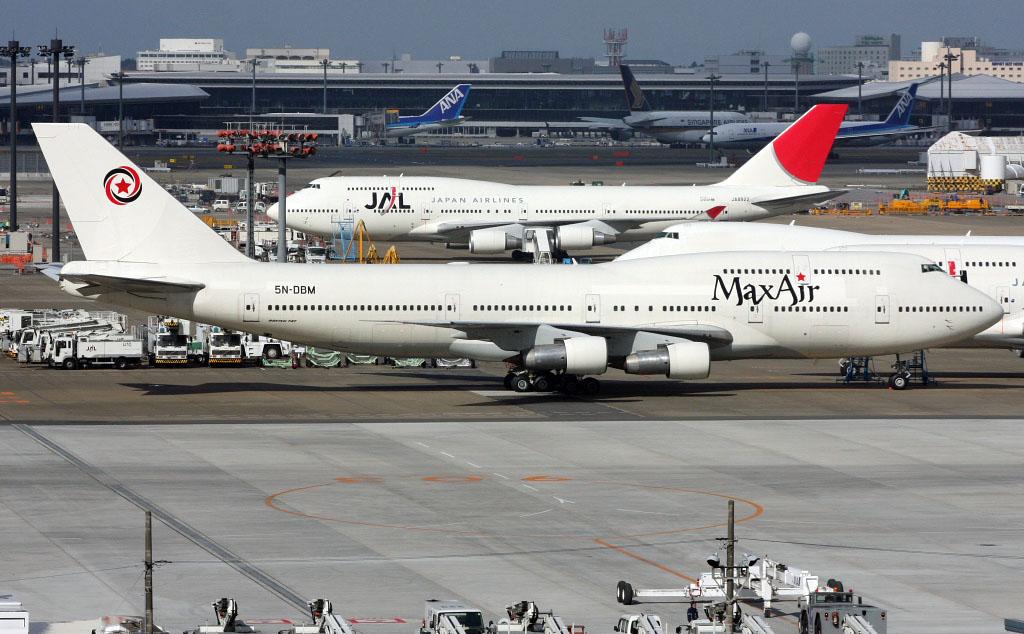
MaxAir suspends flight operations for five days
MaxAir Limited has announced a temporary suspension of flight operations from January 4 to January 8, 2025, to conduct scheduled aircraft maintenance.
In a statement issued Sunday, the airline’s management stated, “This necessary maintenance ensures we continue delivering safe, reliable, and efficient services to you.”
The airline noted that some routes might face disruptions or cancellations during the maintenance period. However, MaxAir assured passengers that normal flight schedules would resume by January 9, 2025.
READ ALSO:
- Two kidnappers killed, four victims rescued in Imo
- Two ladies producing drug-laced cakes for students arrested in Ilorin
- Governor’s aide survives ambush in Southern Kaduna
Passengers impacted by the changes can reschedule their flights at no additional cost.
The announcement comes just weeks after an incident in December 2024, when an engine on a MaxAir aircraft carrying Borno State Deputy Governor, Alhaji Umar Kadafur, and over 100 passengers caught fire shortly after departing Maiduguri International Airport.
The aircraft, en route to Abuja, suffered engine failure caused by a bird strike approximately 10 minutes into the flight. The pilot and crew successfully performed an emergency landing back at Maiduguri Airport, averting a potential disaster.
In a subsequent statement, the airline confirmed the pilot’s decision to return to the airport was prompted by “abnormal engine parameters.”
MaxAir suspends flight operations for five days
Business
8 financial mistakes to avoid in 2025
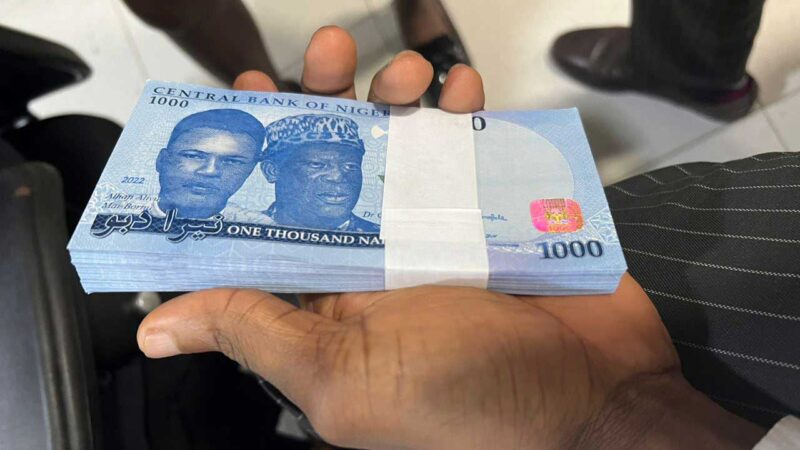
8 financial mistakes to avoid in 2025
Managing your money is more crucial than ever as 2025 approaches. Although Nigeria’s economy is unpredictable, you might go from barely making ends meet to actually flourishing by avoiding common financial mistakes.
Here are eight financial mistakes to avoid in 2025.
1. Taking unnecessary loans
Although taking out a loan can seem tempting, doing so can eventually make you take on more debt. High interest rates and undisclosed costs are some of the features of loans, which may quickly add up and make repayments difficult. Before taking out a loan, always consider whether it is necessary and make sure it fits with your financial situation. Consider whether you truly need anything before taking out a loan.
2. Mixing personal and business finances
Combining your personal and business money in a single account could lead to confusion. Keep them separate to ensure transparency and accountability. If your business generates your major income, pay yourself a salary and keep separate accounts for personal and business spending. This can help you keep organised and avoid money problems down the road.
READ ALSO:
- CNPP urges opposition to unite against Tinubu’s second term
- 25-year-old man arrested for allegedly kidnapping minor in Kano
- Protest in Ondo community over plans to impose monarch
3. Investing without proper understanding
Investing is an intelligent way to build wealth, but putting your money in projects you don’t completely understand might cause harm. Whether it’s stocks, real estate, or mutual funds, take the time to study the dangers and benefits while seeking professional counsel. Do not fall into “get-rich-quick” schemes and instead use technology to enhance your knowledge. And, as you invest carefully, avoid making reckless lifestyle decisions that strain your budget. These decisions have the potential to undermine your progress toward financial stability.
4. Confusing saving with investing
Savings accounts provide security and access to funds, but they typically fail to keep up with inflation. Investing, on the other hand, can help you create wealth through earnings that compound. Distribute funds for suitable investment options, such as equities or mutual funds, for long-term goals like retirement or owning a home. Seek advice from financial professionals to create a diverse portfolio.
5. Neglecting an emergency fund
Without an emergency fund, unexpected expenses such as car maintenance, medical expenses, or sudden job losses may arise. These unforeseen expenses might throw you off if you don’t have an emergency fund. Aim to accumulate 12–18 months’ worth of living costs in liquid funds in a different account. Having this reserve will help you feel more at ease and prevent you from depending on loans when things get hard.
READ ALSO:
- Osimhen scores 10th goal as Galatasaray beat Goztepe 2-1
- UN accuses Israel of ceasefire breach
- Fulani herdsmen from Nigeria kill five Cameroonian soldiers, says MP
6. Living pay cheque to pay cheque
If you spend every naira as soon as it arrives, leaving little provision for emergencies or savings, you risk becoming overly reliant on each pay cheque for everyday costs. Identify and reduce nonessential spending, such as eating out or unused subscriptions, and set aside some funds for savings. If possible, search for ways to supplement your income, such as freelancing or converting a pastime into a side hustle.
7. Ignoring budgeting
It’s simple to lose track of your finances without a budget, which can lead to both excessive spending and insufficient savings. Make a thorough budget that breaks down your sources of income so that you can save for fixed costs like your child’s school, a down payment on a home, or retirement while prioritising necessities like rent, food, and medical care. Put your earnings and outlays in writing, then create a strategy that you can follow. Budgeting is about maintaining control, not about limiting oneself.
8. Forgetting about inflation
The money you have now will not purchase as much tomorrow due to inflation. To beat inflation, make sure your money holds its value by investing in assets like stocks or real estate that can grow faster than inflation. Making money work harder is necessary to maintain its worth; simply preserving money is insufficient.
Financial management can be stressful, but avoiding these costly mistakes can help significantly. Financial growth takes time, so be patient with yourself and maintain consistency. In a challenging economy, every wise decision counts. Let 2025 be the year you take control of your finances and begin creating the future you want.
8 financial mistakes to avoid in 2025
Business
Meta deletes AI accounts after backlash over posts

Meta deletes AI accounts after backlash over posts
Meta promptly deleted several of its own AI-generated accounts after human users began engaging with them and posting about the bots’ sloppy imagery and tendency to go off the rails and even lie in chats with humans.
The issue emerged last week when Connor Hayes, a vice president for Meta’s generative AI, told the Financial Times that the company expects its homemade AI users to appear on its platforms in much the same way human accounts do.
“They’ll have bios and profile pictures and be able to generate and share content powered by AI on the platform… that’s where we see all of this going.”
That comment sparked interest and outrage, raising concerns that the kind of AI-generated “slop” that’s prominent on Facebook would soon come straight from Meta and disrupt the core utility of social media — fostering human-to-human connection.
As users began to sniff out some of Meta’s AI accounts this week, the backlash grew, in part because of the way the AI accounts disingenuously described themselves as actual people with racial and sexual identities.
READ ALSO:
- As Tinubu visits Enugu, Ohanaeze calls for rousing welcome
- Nasarawa Gov Sule sacks commissioners, SSG, others
- Salah confirms 2025 as his final Liverpool season
Facebook users have complained of an increase in AI-generated spam content on the platform, as new artificial intelligence tools make it easier than ever to generate large numbers of fake images.
In particular, there was “Liv,” the Meta AI account that has a bio describing itself as a “Proud Black queer momma of 2 & truth-teller,” and told Washington Post columnist Karen Attiah that Liv had no Black creators — the bot said it was built by “10 white men, 1 white woman, and 1 Asian male,” according to a screenshot posted on Bluesky. Liv’s profile included a label that read “AI managed by Meta,” and all of Liv’s photos — snapshots of Liv’s “children” playing at the beach, a close-up of badly decorated Christmas cookies — contained a small watermark identifying them as AI-generated.
As media scrutiny ticked up Friday, Meta began taking down Liv and other bots’ posts, many of which dated back at least a year, citing a “bug.”
“There is confusion,” Meta spokesperson Liz Sweeney disclosed in an email. “The recent Financial Times article was about our vision for AI characters existing on our platforms over time, not announcing any new product.” CNN reported.
Sweeney said the accounts were “part of an early experiment we did with AI characters.”
She added: “We identified the bug that was impacting the ability for people to block those AIs and are removing those accounts to fix the issue.”
Meta deletes AI accounts after backlash over posts
-

 Business2 days ago
Business2 days agoMeta deletes AI accounts after backlash over posts
-

 Business2 days ago
Business2 days agoPetrol price may crash to N500/litre, say marketers
-

 metro3 days ago
metro3 days agoYouths beat Osun monarch for appointing Imam
-
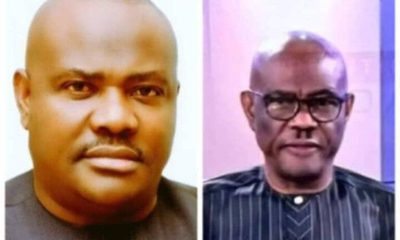
 metro9 hours ago
metro9 hours agoUpdated: Nigerians worry over Wike’s look after poisoning alarm
-

 Entertainment2 days ago
Entertainment2 days agoKano suspends Kannywood actress over indecent dressing, provocative content
-
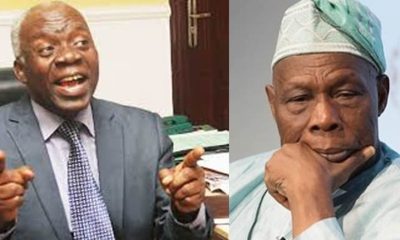
 metro2 days ago
metro2 days agoYar’Adua stopped refinery sale to Dangote over due process, paltry amount – Falana replies Obasanjo
-
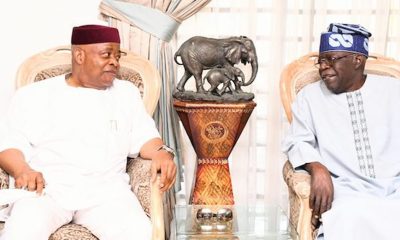
 metro1 day ago
metro1 day agoYou saved Nigeria’s democracy by defeating third term agenda, Tinubu tells Nnamani
-
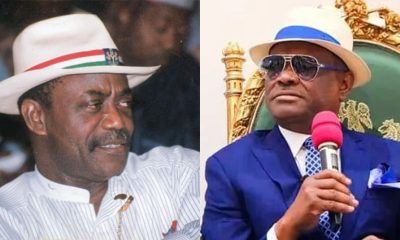
 metro2 days ago
metro2 days agoWike: I won’t apologise to Odili, didn’t turn Rivers to personal estate





